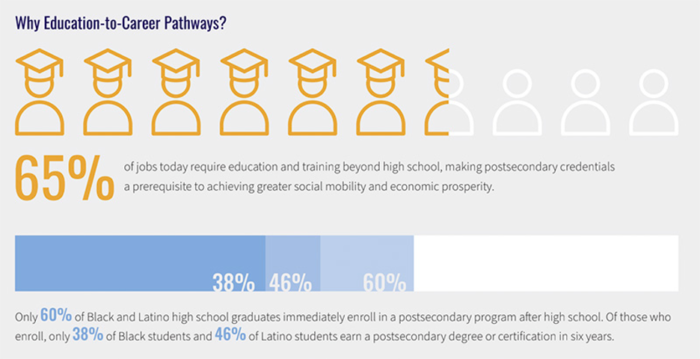Accelerate ED: Building A Better Path between K-12, College, and Work

How Accelerate ED design teams are building essential opportunities for all students to earn postsecondary credentials
Without some form of postsecondary training, it is very difficult for today’s workers to find success. And with record-high inflation rates, American families are increasingly struggling to afford the cost of food, housing, gasoline, utilities, and other goods.
With a bachelor’s degree, associate degree, or other postsecondary credential of value, students are not only better prepared for the workforce, but gain the skills and experience needed to achieve greater social mobility and economic prosperity. With over 65 percent of today’s jobs requiring postsecondary education, education and training beyond high school has become essential for students, especially those who have traditionally been unable to access these opportunities.

Yet, there are very real barriers keeping students from accessing postsecondary education: rising costs; a lack of awareness of the opportunities available; and difficulty understanding how to navigate complicated systems to reach their goals.
As leaders from across the field grapple with ways to address these challenges and create more equitable student outcomes, innovative models are beginning to emerge. A 13th year education model, for instance, offers high school students early access to postsecondary opportunities so that they can earn credits applicable to their field of study on an accelerated timeline without having to take on debt.
Earlier this year, ESG partnered with the Bill & Melinda Gates Foundation to launch Accelerate ED: Seamless Pathways to Degrees and Careers, an initiative through which we are supporting twelve design teams from diverse communities to work together and achieve this goal: to help high school students take an additional year of courses related to their interests and earn enough credits to complete their associate degree one year after high school while gaining valuable experience and career preparation—at little to no cost.
Twelve design teams made up of district and state leaders, higher education representatives, businesses, and community leaders are coming together under this initiative to build or scale promising cross-sector initiatives—from dual enrollment models to career and technical education (CTE) and other work-based learning opportunities— that are helping to streamline the pathway from high school to college and beyond. “While their specific approaches will vary, they will share common design principles, such as seeking innovative instructional models to make these programs more accessible for students and considering creative ways to attract funding to sustain this work and ensure ongoing affordability for future classes of students,” said Director of Education Pathways and Early Learning for the Bill & Melinda Gates Foundation Sara Allan.
These strategies are already proving to be effective in improving outcomes and creating opportunities for students. Research on effective practices across early college, CTE, and dual enrollment models shows strong evidence of impact on outcomes, including increases in high school graduation, college enrollment, and degree attainment.
In addition, growing evidence about community college guided pathways suggests that redesigning and streamlining students’ journeys to and through college can improve student outcomes, and in many cases, institutions are continuing to use an equity lens to reduce completion gaps based on race.
At ESG, we are excited to be working side-by-side with the design teams to help them build and scale their 13th year models, providing them opportunities to collaborate and share best practices and refine their pathway models.
Here’s a look at the grantees and the we’re helping them achieve:
Arizona – ElevateEdAZ: Advanced Manufacturing Career Connected Pathways
ElevateEdAZ, the strategic education initiative of the Greater Phoenix Chamber Foundation, will use advanced manufacturing as a model industry to help students earn 30 credits of dual enrollment toward manufacturing degrees at Maricopa County Community Colleges and attain a 13th-year associate degree. The team will replicate the pathway developed in Mesa Public Schools at other high schools in Phoenix Union High School District and provide a demonstrative model to other districts throughout the state to meet the needs of Arizona’s industry.
California – Linking Learning for Completion
Linking Learning for Completion will help students attain an associate degree by the end of their 13th year by mapping a set of pathways that meet California’s four-year institution entrance policies, connect to community-specific industry fields, and incorporate work-based learning for credit. These efforts will include the development of a College Acceleration Playbook for Linked Learning Communities along with community-specific action plans to launch, strengthen, or expand 13th year strategies.
Illinois – Accelerated Model Pathways for Information Technology
Accelerated Model Pathways for Information Technology will engage three leading Illinois school districts and their postsecondary partners to design and launch an accelerated version of the existing IT Model Programs of Study. Students will be able to complete an IT associate degree program in year 13 that directly leads to high-quality employment opportunities or further education and will have flexibility to pursue computer science bachelor’s degree programs through accelerated models at Illinois universities.
Indiana – Indianapolis Career Pathways
Indianapolis Career Pathways will design a comprehensive pathway in healthcare, IT, or advanced manufacturing that grants students an associate degree at the end of year 13, one year after high school graduation. Career pathways in key sectors will be designed and expanded with 13th year opportunities through existing delivery models such as the dual credit program, Associate Accelerated Program, and/or Modern Apprenticeship.
Kentucky – Eastern Kentucky Student Success Pipeline
The Eastern Kentucky Student Success Pipeline will provide more than 12,000 rural students across 35 schools in 12 districts with access to flexible, credit-bearing general education coursework, specific courses aligned to workforce needs (nursing, manufacturing, education, etc.) and embedded tutoring services through local collaboration efforts and products such as the Wiley Degree Accelerator.
Louisiana – Growing Bridge Year Pathways Across New Orleans
Growing Bridge Year Pathways Across New Orleans will support three local training providers to create industry-aligned pathways to an associate degree or equivalent industry-based credential. Next Level NOLA is a bridge year program with business services, digital media/IT, and skilled crafts pathways. New Orleans Career Center is a technical training provider in health care, engineering, and hospitality/tourism; beginning next year they will operate LAUNCH, another bridge year program. Operation Spark is a training provider in software development and is focusing on expanding programming into a 13th year.
Massachusetts – Early College Promise
This pilot program in Massachusetts aims to build upon the statewide Early College designation by offering current Early College participants underrepresented in higher education the opportunity to attain an associate degree or 60 credits toward a four-year degree through the Early College Promise year, free of charge. Under this model, students in state-approved Early College programs can opt to defer high school graduation for a year and take a full load of college courses while continuing to receive high-quality wraparound supports from both the high school and college. Assuming successful outcomes during the pilot, Massachusetts hopes to make this program available to underrepresented students in Designated Early College programs throughout the state.
New Mexico – The Four Corners Energy Transition Initiative
The Four Corners Energy Transition Initiative seeks to build a regional system of college and career pathways ensuring that students will not only have access to a sequence of three or four career and technical courses but also aligned core academics emphasizing related real-world application, project-based learning, and performance assessment. Additionally, a continuum of work-based learning experiences and personalized student supports are essential components of each pathway.
New York – FutureReadyNYC
FutureReadyNYC will work to develop a blueprint for dual enrollment and year 13 career pathways that incorporate personalized advising, work-based learning, and the acquisition of skills for an increasingly technology-driven workforce. The partnership will implement a sequence of early college credits, paid work experience, essential skill building, and advising, as well as onramps to year 13 programming. The objective is to accelerate paths toward a degree and help identify best-in-class practices so they can be scaled and applied in other locations.
Ohio – 13th Year Pathway to Career Success
In Dayton, Ohio, leaders across K-12, higher education, and the local workforce have come together to strengthen pathways to in demand jobs such as healthcare, IT, and advanced manufacturing using dual enrollment. Students who earn a critical number of “pathway” college credits by 12th grade will be automatically accepted into a 13th year to complete an associate degree. Successful candidates are guaranteed acceptance to a four-year university to complete their bachelor’s degree after completion of their associate degree.
Texas – Scalable Success
Leaders in Central Texas are working to update the current P-TECH model to enable students to complete an associate degree by their 13th year. Using several existing P-TECH campuses as a guide, this grant will support developing a blueprint for how other P-TECH high schools across the state can offer a 13th year model and identify key policy and funding conditions to enable greater scale within the region and statewide.
Utah – Promise Partnership Pathways Initiative
The Promise Partnership Pathways Initiative will work with a single pilot high school serving 2,000 students in Salt Lake City to create intentional pathways designed for students to earn 30 college credits by senior year with an additional year resulting in an associate degree. To do so, the initiative seeks to identify a clear set of concurrent enrollment and 13th year courses that lead to an associate degree or can transfer to a four-year program. Through a combination of student recruitment and awareness-building across the community, developing student work opportunities and business partnerships, and teacher recruitment and retention efforts, the initiative hopes to grow the pathways of focus and replicate the effort at three high school sites in Salt Lake City School District.



